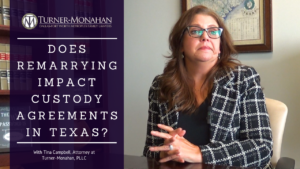
Family law issues can be some of the most challenging and emotional legal matters people face. From divorce and child custody to property division and spousal maintenance, these issues require a deep understanding of the law and the unique needs of each family.
In Texas, the Family Code provides a comprehensive set of laws that govern these matters, but the application of these laws can vary based on local court rules and practices in different regions, such as Fort Worth, Dallas, and Parker. Understanding these differences is crucial for anyone navigating family law issues in Texas.
For personalized advice, please contact Attorney Tyler Monahan, partner at Turner-Monahan, PLLC, to discuss your case.
Understanding the Texas Family Code and Its Impact on Families
The Texas Family Code is a comprehensive legal framework that governs family-related issues throughout the state. Covering areas such as marriage, divorce, child custody, and support, the Code ensures fair treatment for all family members involved in legal proceedings. It provides guidelines and rules that protect the rights and interests of spouses, parents, and children, helping to manage and resolve family disputes efficiently.
Divorce and Spousal Maintenance
Divorce is a significant life event that affects all parties involved. The Texas Family Code (§6.001) outlines the grounds for divorce, including no-fault grounds like insupportability and fault-based grounds such as adultery or cruelty. Spousal maintenance, often called alimony, is also covered under the Texas Family Code (§8.051). It specifies the conditions under which a spouse may be entitled to receive maintenance and the factors the court considers in determining the amount and duration.
In Fort Worth, Dallas, and Parker, divorce procedures follow the Texas Family Code but can vary slightly based on local court rules and practices. For instance, a spousal maintenance attorney in Fort Worth might emphasize different aspects of the code compared to one in Dallas or Parker due to local judicial preferences.
Child Custody and Support
Child custody and support are crucial aspects of family law. The Texas Family Code (§153.002) states that the best interest of the child is the primary consideration in custody decisions. It provides detailed guidelines on conservatorship (custody) and possession (visitation).
In Dallas, family law attorneys might approach custody cases differently compared to those in Fort Worth or Parker due to the varying local customs and court procedures. For example, Dallas family law firms might have more experience dealing with complex urban family dynamics, while attorneys in Parker might focus more on rural family issues.
Property Division in Divorce
Dividing marital assets is often one of the most contentious parts of a divorce. The Texas Family Code (§7.001) mandates a “just and right” division of community property. This means the court will divide the property in a manner it deems fair, which may not always be equal.
Marriage asset division and divorce asset split require careful consideration of all assets, including real estate, investments, and personal property. A prenuptial agreement lawyer can help couples protect their assets before marriage, while postnuptial agreement services can provide similar protections after marriage.
Differences in Family Law Procedures in Fort Worth, Dallas, and Parker
While the Texas Family Code provides a uniform framework, the implementation can differ in Fort Worth, Dallas, and Parker due to local court rules and practices.
Fort Worth
Fort Worth courts are part of Tarrant County and have specific procedures for handling family law cases. For instance, the best divorce attorney in Fort Worth will be familiar with the local judges and their preferences. This knowledge can be crucial in contested divorce cases where the outcome heavily depends on courtroom presentation and local judicial inclinations.
Dallas
Dallas courts handle a large volume of family law cases, given the city’s size. Dallas family law attorneys often deal with complex cases involving high-net-worth individuals or contentious custody battles. It is important to hire family law firms that have local knowledge and experience with the specific practices of Dallas courts to navigate these complexities effectively.
Parker
Parker, being a smaller and more rural area, has different dynamics. Family law attorneys in Parker might deal more with issues unique to rural communities, such as disputes over large properties or family-owned businesses. The approach to family law in Parker is often more personalized due to the close-knit nature of the community.
Cost-Effective Family Law Solutions
Securing an affordable family lawyer can be difficult, especially during the stressful and costly times of a divorce or custody battle. Turner Monahan PLLC uses a “fee-for-service” model, unlike the typical “flat fee” approach. Following an initial consultation, if a client chooses to retain our services, we delve into their specific needs, whether they are initiating a divorce, responding to one, or entering ongoing proceedings.
Turner Monahan PLLC is committed to providing high-quality legal support without excessive costs. Whether you need a family law specialist or a local divorce attorney, Turner Monahan PLLC has the knowledge and experience to help you navigate your legal challenges.
Discuss Your Case With Turner Monahan, PLLC: Your Advocates in Difficult Times
Understanding the Texas Family Code and its application in different areas is crucial for families facing legal issues. Whether you’re in Fort Worth, Dallas, or Parker, the code provides a framework that ensures fair treatment.
However, local practices and court rules can influence how these laws are applied. Turner Monahan PLLC is well-versed in all local laws and regulations and can offer you the best advice after thoroughly understanding your case. Schedule a free, no-obligation consultation with attorney Tyler Monahan to discuss the details.
Disclaimer
The commentary and opinions are for informational and educational purposes only and not to provide legal advice. You should contact an attorney in your state to obtain legal advice concerning any particular issue or problem. You can become a client and enter the attorney-client privilege only after hiring Turner-Monahan, PPLC, by signing a written retainer agreement.


